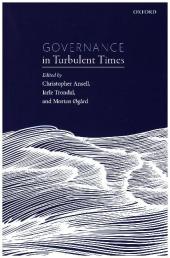 Neuerscheinungen 2016Stand: 2020-02-01 |
Schnellsuche
ISBN/Stichwort/Autor
|
Herderstraße 10
10625 Berlin
Tel.: 030 315 714 16
Fax 030 315 714 14
info@buchspektrum.de |

Christopher K. Ansell, Morten ¯g†rd, Jarle Trondal
(Beteiligte)
Governance in Turbulent Times
Herausgegeben von Ansell, Christopher K.; Trondal, Jarle; ¯g†rd, Morten
2016. 322 S. 240 mm
Verlag/Jahr: OXFORD UNIVERSITY PRESS; OUP OXFORD 2016
ISBN: 0-19-873951-6 (0198739516)
Neue ISBN: 978-0-19-873951-7 (9780198739517)
Preis und Lieferzeit: Bitte klicken
This volume explores the way in which political organizations must confront situations of relatively high uncertainty and unpredictability with limited knowledge, and how turbulent times provide opportunities to investigate the sustainability of governance systems.
What are the conditions for political development and decay, and the likelihood of sustained political order? What are the limits of established rule as we know it? How much stress can systems tackle before they reach some kind of limit? How do governments tackle enduring ambiguity and uncertainty in their systems and environments? These are some of the big questions of our time. Governance in turbulent times may serve as a stress-test of well-known ways of governing
in the 21st century.
Governance in Turbulent Times discusses this pertinent challenge and suggests how governments and organizations cope with and live with turbulence. The book explores how organizations and institutions respond to precipitous, conflicting, and novel-in short, turbulent-governance challenges. This book is a comprehensive and ground-breaking endeavor to understand how governance systems respond to turbulent challenges, and how turbulent times provide excellent opportunities to investigate
the sustainability of governance systems. The book illustrates how politics, administrative scale and complexity, uncertainty, and time constraints can collide to produce turbulence. Building on prior work in organization theory and political science, we argue that turbulence refers to four properties
related to the interaction of demands for action: variability, consistency, expectation, and unpredictability. Turbulence occurs where the interaction of demands is experienced as highly variable, inconsistent, unexpected, and/or unpredictable.
Christopher Ansell is Professor of Political Science at the University of California, Berkeley. He is the author of Pragmatist Democracy: Evolutionary Learning as Public Philosophy (OUP, 2011) and Schism and Solidarity in Social Movements (CUP, 2000). His fields of interest include organization theory, political sociology, public administration, and Western Europe.
Jarle Trondal is Professor of Public Administration at University of Agder, Department of Political Science and Management, Norway, and Professor of European Studies at University of Oslo, ARENA Centre for European Studies, Norway. He is also Honorary Professor at University of Copenhagen, Denmark. His main fields of research include European public administration, administrative behavior, administrative reform, and organizational studies. His publications include An Emergent European
Executive Order (OUP, 2010), Unpacking International Organisations (with Martin Marcussen, Torbjorn Larsson and Frode Veggeland, MUP, 2010), The Agency Phenomenon in the European Union (with Madalina Busuioc and Martijn Groenleer, MUP, 2012), and The Palgrave Handbook on the European Administrative (with
Michael W. Bauer, Palgrave Macmillan, 2015).
Morten ¯g†rd is a Professor of Local Government Studies at University of Agder, Department of Political Science and Management, Norway and he is the Academic Director of the Life Long Learning Master´s Program in Leadership at University of Agder. His main fields of research include local government and governance, reforms in public sector, organization studies, and administrative behavior. Recent publications include The Rise of the Networking Region (with Harald
Baldersheim and Vegard Haug, Ashgate, 2011) and Do Networks Matter? Network Involvement and Policy Learning in Nordic Regions (forthcoming in Journal of Baltic Studies).


